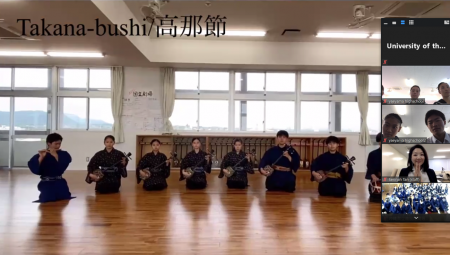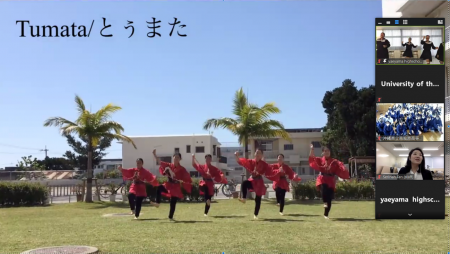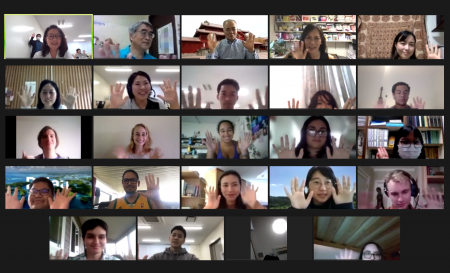Our Islands, Our Future – Global Leadership for Island SDGs University of the Ryukyus Online Intensive Study Program (OISP) AY 2020-21
- April 22, 2021
- ご報告
In May 2018, the University was awarded acceptance of our proposal for the “Inter-University Exchange Project” by the Japan Ministry of Education, Culture, Sports, Science and Technology MEXT). With a five-year financial grant from MEXT, the University has been able to propel a regionally beneficial educational project titled “Developing Global Leaders in the Pacific Island Region for its Sustainable Development via COIL Technology”.
This project aims to increase student mobility within the Pacific islands and foster leadership equipped to make impactful contributions to the sustainable development of the region. In particular, the project provides a wide selection of classes utilizing COIL, in which students from our university and partner institutions in the Pacific island region (namely Hawaii, Guam, Micronesia, Palau and the Marshall Islands) participate. The project also provides financial support to both inbound and outbound exchange students at our partner institutions.
OISP AY2020-21 provided students from the University’s Pacific partners with the opportunity to participate in a short-term intensive study program aimed at fostering global leadership to propel sustainable development for the Pacific island region. The program featured a series of lectures and group work with opportunities for collaborative learning on common issues faced by countries and territories in the Pacific island region to encourage multicultural understanding and leverage knowledge on SDGs, toward the eventual objective of nurturing the next generation of global-minded leaders.
In light of the ongoing pandemic, the program was conducted online between 4th to 22nd March 2021. The University’s first attempt in holding both inbound and outbound intensive study programs simultaneously attracted 15 student participants – seven inbound students (University of Hawaii at Hilo: 4, Kauai Community College: 2, University of Guam: 1) and eight outbound students from the University (including one international student from Palau). Program contents were conducted wholly in English to facilitate collaboration between overseas and Japanese students.
In place of in-person interaction, the program included as part of its curriculum a virtual eco-campus tour, broadcasting of videos of traditional Okinawa dance as performed by local high school students together with a live discussion between high school students and OISP participants, as well as a virtual workshop centered on the theme of leadership helmed by one faculty member and three graduate students from the University of Hawaii at Manoa. These activities met with positive reactions from participants, who commended the program for enhancing their understanding of Okinawa’s culture and traditions, while at the same time encouraging them to learn more about the prefecture. In particular, participants praised efforts by the local high school students, adding that their videos helped to introduce them to other lesser-known aspects of traditional performing arts in Okinawa.
The OISP AY2020-21 lecture lineup featured themes integral to island regions such as sato-umi and sato-yama (land and sea eco-communities), rural homesteads and disaster mitigation, management of ocean resources, migration and soft power, language revitalization, Okinawa culture and history, as well as global leadership. Through close cooperation with our overseas partners and University alumni, OISP AY2020-21 was able to design a curriculum of engaging lectures that greatly benefited both inbound and outbound exchange students.
The omnibus lineup featured 15 different instructors – six from the University (including one professor emeritus and one part-time instructor), seven from the University’s partner institutions, and two external representatives (one from the United Nations University’s Institute for Advanced Studies on Sustainability and one University alumni).
To maximize time for ample interaction between student participants, lectures were conducted across a series of synchronous sessions conducted via Zoom. Students were divided into groups to exchange opinions and discuss given topics in Zoom breakout rooms. One notable development that occurred midway through the program was the way in which students overcame differences in language and proficiency levels to bridge gaps in effective communication. In a display of synergy borne from collaborative learning, international participants proactively employed the use of online tools such as Google Translate, trying to express themselves in Japanese as much as they could to better communicate and understand their Japanese peers.
In their final group presentations, students were divided into four groups, with each group selecting one particular SDG from the 17 SDGs as their presentation theme. Participants cooperated to overcome differences in time zones and language barriers, balancing individual commitments against a limited timeframe to complete their assignments, which consisted of a series of PowerPoint presentation slides and a seven-minute synchronous online group presentation.
While the OISP AY2020-21 is the second time that the project has conducted a virtual intensive program, it was the first attempt at combining short-term inbound and outbound students to form an integrated program. This simultaneous approach brought many advantages, most significantly a deepening of learning outcomes through synchronous student collaboration, as well as ample opportunities for personal interaction, according an element of authenticity to virtual exchange.
OISP AY2020-21 also provided the opportunity for faculty members to explore possibilities for engaging collaborative international learning. In the lecture on language revitalization that compared situations in Okinawa and Hawaii, students discussed issues such as native language education and the social role performed by universal languages such as English. Such active exchanges helped in the creation of deeper understanding through multiple perspectives, attesting to the potential of COIL on enhancing the quality and depth of tertiary-level curriculum.
The program gained positive feedback from participants, who said they enjoyed interacting with their peers and gained significant learning outcomes from the variety of classes offered. Students also said that the program accorded them the rare experience of engaging in collaborative learning with people of different cultural and linguistic backgrounds.
The University aims to further enhance future program content and assessment methods with their partner institutions, so as to actively contribute to the mutual development of future leadership for the Pacific island region.
<Online lectures>
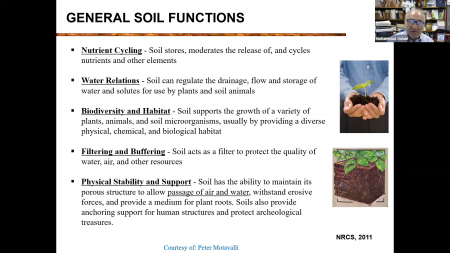
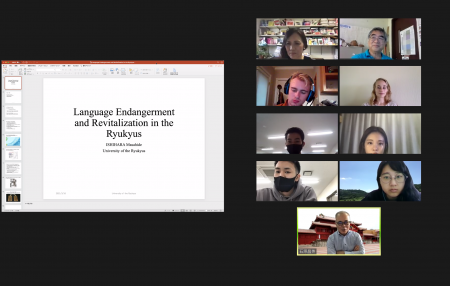
<Breakout rooms>
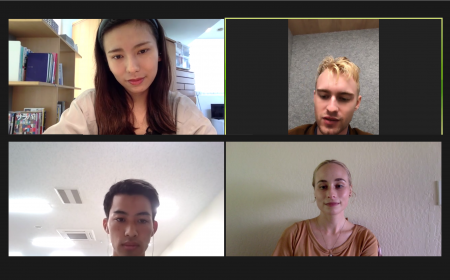
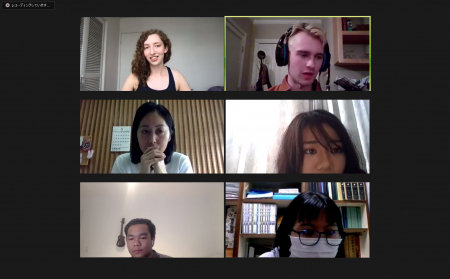
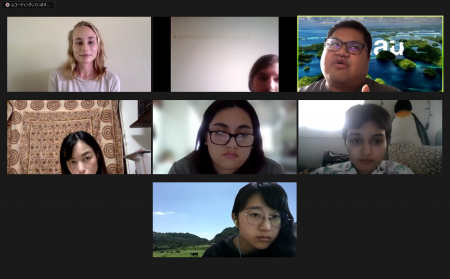
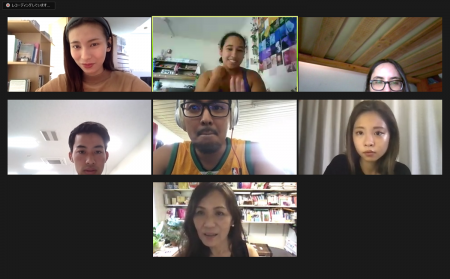
<Collaborative session with University of the Ryukyus Ecological Campus Student Organization>
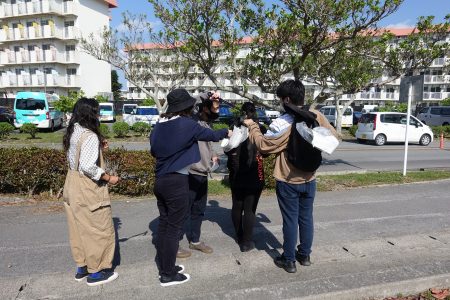
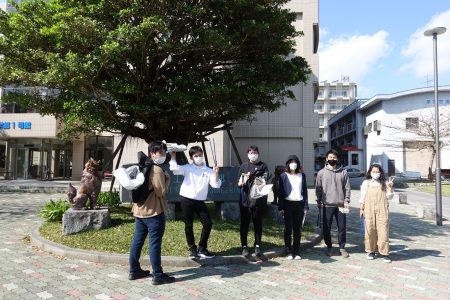
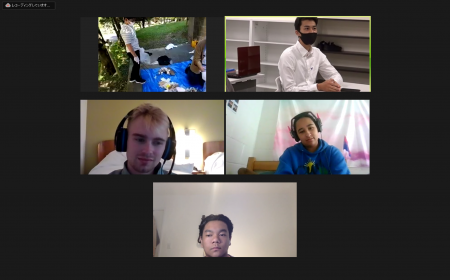
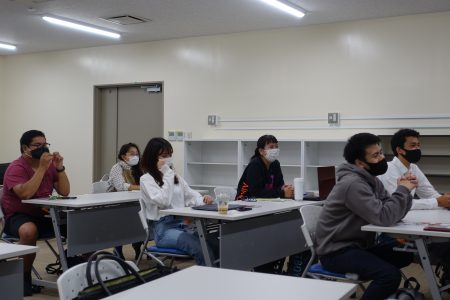
<Dialogue with Okinawa high school students>
